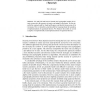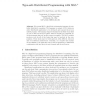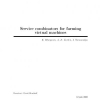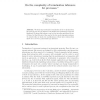115
click to vote
TGC
2007
Springer
15 years 8 months ago
2007
Springer
Distributed applications can be structured using sessions that specify flows of messages between roles. We design a small specific language to declare sessions. We then build a c...
104
click to vote
TGC
2007
Springer
15 years 8 months ago
2007
Springer
Abstract. We study the link between formal and cryptographic models for security protocols in the presence of passive and adaptive adversaries. We first describe the seminal resul...
118
click to vote
TGC
2007
Springer
15 years 8 months ago
2007
Springer
Abstract. We propose and discuss foundations for programmable overlay networks and overlay computing systems. Such overlays are built over a large number of distributed computation...
101
click to vote
TGC
2007
Springer
15 years 8 months ago
2007
Springer
Abstract. We propose Architectural Design Rewriting (ADR), an approach to formalise the development and reconfiguration of software architectures based on term-rewriting. An archi...
131
click to vote
TGC
2007
Springer
15 years 8 months ago
2007
Springer
Abstract We present ML5, a high level programming language for spatially distributed computing. The language, a variant of ML, allows an entire distributed application to be develo...
TGC
2007
Springer
15 years 8 months ago
2007
Springer
Secure information flow analysis aims to prevent programs from leaking their H (high) inputs to their L (low) outputs. A major challenge in this area is to relax the standard noni...
TGC
2007
Springer
15 years 8 months ago
2007
Springer
TGC
2007
Springer
15 years 8 months ago
2007
Springer
We study type systems for termination in the π-calculus from the point of view of type inference. We analyse four systems by Deng and Sangiorgi. We show that inference can be done...
103
click to vote
TGC
2007
Springer
15 years 8 months ago
2007
Springer
Many techniques exist for statically computing properties of the evolution of processes expressed in process algebras. Static analysis has shown how to obtain useful results that c...
125
click to vote
TGC
2007
Springer
15 years 8 months ago
2007
Springer
In computing systems, trust is an expectation on the dynamic behavior of an agent; static analysis is a collection of techniques for establishing static bounds on the dynamic behav...




